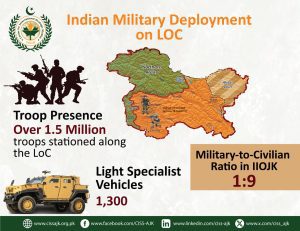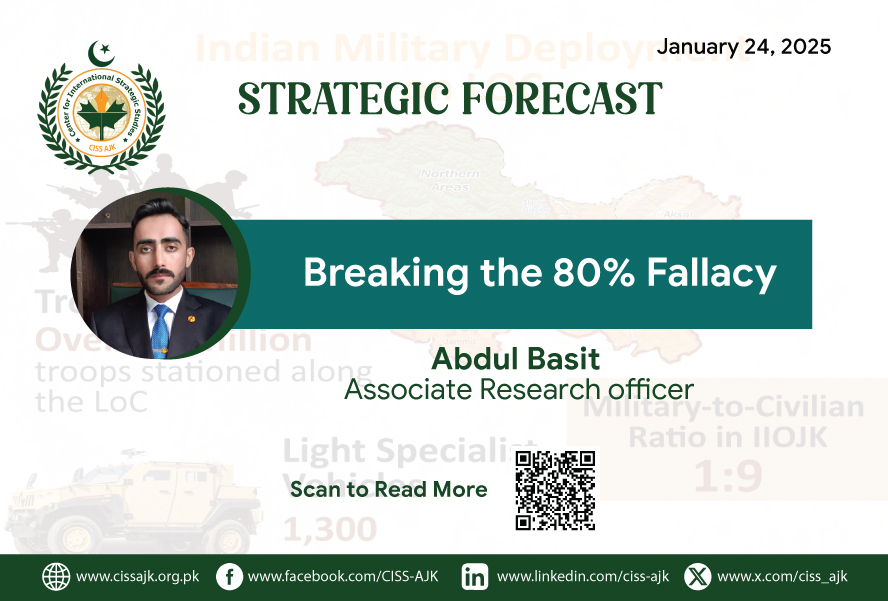India’s Accusations and Narratives against Pakistan
Yet another accusation comes from India, as during the annual Army Day press conference, Indian Army Chief General Upendra Dwivedi accused Pakistan of being the epicenter of terrorism, asserting that 80 percent of terrorists active in Indian Illegally Occupied Jammu and Kashmir (IIOJK) were Pakistanis. This is not the first time that it has happened, rather India has been perpetually upholding this mantra for a long time now. The sweeping allegations, devoid of concrete any evidence, exhibit Indian attempts aimed at delegitimizing the indigenous Kashmiri armed struggle within the Indian-occupied territory. By framing the resistance movement as foreign-backed terrorism, India seeks to obscure the harsh realities of its occupation and oppression in the disputed territory. It is true that India faces numerous internal and external challenges, it appears to be prioritizing short-term gains, achieved through the concealment of its failure through such anti-Pakistan narratives, at the expense of regional peace in South Asia.
Militarization of Kashmir and Weaponization of Modern Technology
 The IIOJK is most heavily militarized regions around the globe as various reports indicate that the number of troops has reached at least 1.5 million. This intensive military presence breeds a high civilian-to-military ratio of around 9; 1. This amount of saturation not only represents the volatile picture of the region permeated with dissent against the occupying power but it also suggests that such a heavy presence of military sets the stage for resentment because public life gets restricted and compromised. A huge number of these are strategically positioned and actively manned checkpoints are active throughout the region. The deployment of armed and paramilitary forces is actively engaged in suppressing dissent, movements and public gatherings are monitored and deterred strictly using the huge manpower. The over-securitization depicts its embedded offensive posture in the region. The scale and technological sophistication of this military presence make allegations of infiltration from Pakistan-administered Kashmir increasingly implausible, exposing such claims to critical scrutiny.
The IIOJK is most heavily militarized regions around the globe as various reports indicate that the number of troops has reached at least 1.5 million. This intensive military presence breeds a high civilian-to-military ratio of around 9; 1. This amount of saturation not only represents the volatile picture of the region permeated with dissent against the occupying power but it also suggests that such a heavy presence of military sets the stage for resentment because public life gets restricted and compromised. A huge number of these are strategically positioned and actively manned checkpoints are active throughout the region. The deployment of armed and paramilitary forces is actively engaged in suppressing dissent, movements and public gatherings are monitored and deterred strictly using the huge manpower. The over-securitization depicts its embedded offensive posture in the region. The scale and technological sophistication of this military presence make allegations of infiltration from Pakistan-administered Kashmir increasingly implausible, exposing such claims to critical scrutiny.
 India has significantly enhanced its military presence along the LoC with advanced technology and infrastructure. For instance, India’s fortification measures include significant investments in advanced military technology and infrastructure along the LoC. Over 1,000 newly-inducted Armado Armored Light Specialist Vehicles provide enhanced mobility and security to Indian forces in the rugged terrain. These vehicles boast bulletproof capabilities and semi-automated operational systems, providing a tactical advantage for area dominance. In addition, the Indian Army has acquired the Swedish-origin Rocket Launcher Carl Gustaf Mark 4, an ultra-light system weighing only 6.5 kg. With the ability to load and deploy up to four different explosives simultaneously, it is a versatile addition to India’s operational toolkit in the IIOJK region. The weapon system has the capability to penetrate armor and inflict significant damage on heavy equipment, such as tanks, bolstering India’s offensive lethality. Indian military infrastructure along the LoC is further strengthened by the deployment of smart fencing equipped with cutting-edge sensors and high-definition CCTV cameras. These systems are programmed to detect minute movements and relay immediate alerts to command centers, effectively neutralizing potential infiltration attempts. High-tech cameras also monitor activities along border zones, enhancing situational awareness and ensuring rigorous area domination exercises by Indian forces. The addition of 4×4 Light Specialist Vehicles (LSVs), specifically deployed in the Rajouri-Poonch sectors, augments patrol efficacy in high-stakes zones. Patrolling has become an integral element of India’s security architecture, particularly near the zero line of the fencing areas, ensuring a sustained military presence to deter potential threats.
India has significantly enhanced its military presence along the LoC with advanced technology and infrastructure. For instance, India’s fortification measures include significant investments in advanced military technology and infrastructure along the LoC. Over 1,000 newly-inducted Armado Armored Light Specialist Vehicles provide enhanced mobility and security to Indian forces in the rugged terrain. These vehicles boast bulletproof capabilities and semi-automated operational systems, providing a tactical advantage for area dominance. In addition, the Indian Army has acquired the Swedish-origin Rocket Launcher Carl Gustaf Mark 4, an ultra-light system weighing only 6.5 kg. With the ability to load and deploy up to four different explosives simultaneously, it is a versatile addition to India’s operational toolkit in the IIOJK region. The weapon system has the capability to penetrate armor and inflict significant damage on heavy equipment, such as tanks, bolstering India’s offensive lethality. Indian military infrastructure along the LoC is further strengthened by the deployment of smart fencing equipped with cutting-edge sensors and high-definition CCTV cameras. These systems are programmed to detect minute movements and relay immediate alerts to command centers, effectively neutralizing potential infiltration attempts. High-tech cameras also monitor activities along border zones, enhancing situational awareness and ensuring rigorous area domination exercises by Indian forces. The addition of 4×4 Light Specialist Vehicles (LSVs), specifically deployed in the Rajouri-Poonch sectors, augments patrol efficacy in high-stakes zones. Patrolling has become an integral element of India’s security architecture, particularly near the zero line of the fencing areas, ensuring a sustained military presence to deter potential threats.
India continues to allege infiltration from Pakistan despite its advanced security infrastructure, casting doubt on these claims. By externalizing the Kashmir issue, India disregards the local struggle driven by decades of political and economic marginalization. Its militarization of IIOJK escalates regional tensions and contributes to a growing arms race, undermining peace efforts. This strategy not only obscures ground realities but also contravenes international law and UN resolutions supporting Kashmir’s right to self-determination.
The Local Resistance: Indigenous Roots of the Kashmiri Struggle
Jammu and Kashmir, recognized by the UN as a disputed territory, is home to a legitimate struggle for self-determination rooted in decades of systemic oppression and political marginalization. Through strategic use of its diplomatic apparatus, Pakistan has consistently championed the Kashmiri cause at every forum, with its principled stance, providing moral and political support in line with international law and UN resolutions. Pakistani steadfast opposition directly counters India’s attempts to normalize and institutionalize its illegal occupation of IIOJK both domestically and on the global stage, frustrating New Delhi’s narrative-building endeavors.
India’s narrative framing the Kashmiri movement as Pakistan-driven terrorism is a longstanding propaganda tactic. This rhetoric, exemplified by false flag operations like Pulwama serves to divert attention from systemic human rights violations in IIOJK. Such strategies reflect Edward Herman and Noam Chomsky’s Manufacturing Consent theory, where states manipulate narratives to obscure oppression and avoid accountability. Similarly, India’s repeated claims of terrorism emanating from Pakistan serve as a classic example of the Red Herring Fallacy, deflecting attention from the systemic issues within IIOJK. Instead of addressing the suppression of fundamental rights, harsh laws, resource exploitation, and the erosion of statehood, India shifts the narrative to external factors. India’s tactic of framing Kashmiri resistance as terrorism aligns conveniently with global counter-terrorism trends, yet it overlooks the fact that armed resistance in occupied territories is recognized as legitimate under international law and by the theory of the four waves of terrorism.
India faces mounting regional challenges, marked by growing diplomatic isolation. Recent developments in Bangladesh, reflecting an “India-out” sentiment, and its increasing cooperation with Pakistan in political and military spheres signal a shift in South Asia’s strategic landscape. This alignment heightens India’s perception of encirclement, compounding its strategic insecurity. In this manner, such narratives can also depict India’s frustration while failing to deal with diplomatic challenges which seem to blot its image of an aspiring regional and global power.
It can be assumed that such narratives have profound implications for regional stability and international security. Its increasingly aggressive posture pushes South Asia closer to the brink of instability, with the risk of miscalculation escalating exponentially. For Pakistan, matching India’s conventional military advancements is neither economically feasible nor strategically rational. Instead, Pakistan’s reliance on its robust strategic deterrent remains the cornerstone of its security doctrine, ensuring the preservation of a stable deterrence equation in the face of India’s provocative maneuvers. India’s systematic effort to brand the Kashmiri freedom struggle as terrorism, coupled with its belligerent strategic policies, threatens regional and global peace. These developments demand urgent international attention to address the legitimate aspirations of the Kashmiri people and to uphold the principles of justice and stability in South Asia.
Author
Abdul Basit, Associate Research Officer at center for International Strategic Studies, AJK

